More Prominent Role, Increasing Challenges at the Hungarian Contingent in Egypt
Szöveg: General Staff of the Armed Forces of Hungary | 2013. november 21. 11:08The delegation, visiting to the Sinai Peninsula headed by the Chief of the MoD Defence Staff General Dr. Tibor Benkő became convinced about the adequate preparedness and internationally recognised work of the Hungarian Contingent, consisting of military and police personnel.
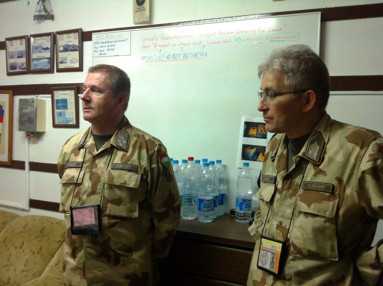
Chief of the Mod Defence Staff General Dr. Tibor Benkő, and Contingent Commander Lieutenant-colonel Attila Nagy
The General was accompanied on his visit by Anikó Farkas, the Head of the MoD Cabinet Office, Dr. Péter Kveck, the Ambassador of Hungary to Egypt, CSM István Kriston, the HDF CSEL, Colonel István Topor, Chief of Peace Operations of the HDF JFC as well as Lieutenant Colonel Attila Márton, the Military Attaché of Hungary accredited to Egypt.
During the visit, the delegation experienced that, as the security situation in the Sinai Peninsula is still not satisfactory, the activity of the Hungarian military and police personnel serving with the Multinational Force and Observers (MFO) units, has become more prominent recently. During the talks conducted in the MFO North Camp and South Camp it has been revealed that the Hungarian Contingent consisting of 26 military and 16 police personnel perform their duty professionally in spite of the increased responsibility and challenges.
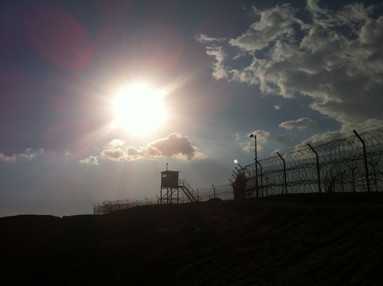
One of the watchtowers of the MFO South Camp
In the MFO the Hungarian military and police personnel perform major military police duties; they are responsible for maintaining the military order and discipline in the whole MFO area of responsibility (AOR). Their duties include criminal investigation, accident investigation, and patrolling, providing escort for convoys and buses, checking and inspecting traffic among others. According to the service members, the criminal investigation poses the greatest challenge from these tasks, mostly because of the different level of language proficiency of the individual nations. The traffic accidents and the minor conflicts and incidents within the camp give reason to most of the concerns in the North, while the shipment and convoy escort tasks mean a permanent occupation in the South. In the North the Hungarian personnel has to collaborate with Fijians and Columbians and in the South with Americans in the greatest number. The members of the Hungarian Contingent perform their service in one-year rotations, but taking place in two phases, so one part of the service members now serving there arrived in September, and the other half had arrived more than half a year ago. In the Contingent’s personnel there are men and women with small children or with extended family, single youths or soldiers, policemen, field officers, officers and NCOs still uncommitted, but living in long-term relationship, such as in case of other tours of duty abroad. According to the commanders’ information the adaptation to the unusual climate (big heat, high humidity), and the confinement owing to the insurgencies having resumed this year give a hard time beyond the service duties.
During his visit, in the staff meetings held in the MFO North Camp and South Camp that is in El-Gorah and in Sharm el-Sheikh, the General appreciated the activity of the Hungarian soldiers and police officers, highlighting the successes attained in the peace-operation tasks. He also spoke about the cooperation and the unity experienced during the record flooding of this year in Hungary, furthermore he informed the personnel about the domestic developments concerning their career model, and gave details of the requirements set against them in the changing security situation.
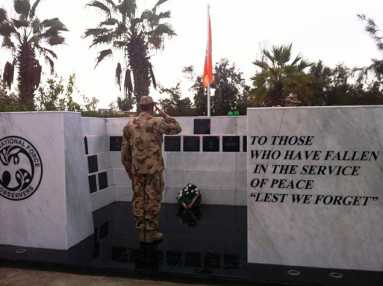
Chief of the Mod Defence Staff General Dr. Tibor Benkő laying a wreath at the Memorial site of the peacekeepers – among them two Hungarians – who have died while serving in the MFO
The visiting General Dr. Tibor Benkő could personally learn about the Contingent’s recent extraordinary act of bravery by saving the valuables during a fire, and their outstanding sports achievements, the stories of which have already appeared on the honvedelem.hu pages. Captain László Tóth, Commander of the Hungarians stationing in the South Camp, particularly stressed the importance of the daily sports activities to the personnel, for which he himself encourages the members of the Contingent, setting a good example before them. Taking exercises is motivated in the South Camp by the improving security situation and the proximity of the seacoast (part of the camp is on the coast itself). The so-called Hungarian bistros (the nations usually have their own community rooms, based on the national characteristics) help the relaxation of the Hungarian Contingent serving in the two camps. In the cultural events arranged there, the soldiers of other nations are also willing to be acquainted with our traditional dishes and other Hungarian cultural products.
In the North Camp among others the Contingent Commander Lieutenant-colonel Attila Nagy, and the MFO Chief of Staff Colonel Thomas W. O’Steen, in the South Camp the Hungarian Commander Captain László Tóth and Lt. Col. Oscar H. Pintado, respectively gave briefings for the Chief of the MoD Defence Staff. In the briefings, it has been said that between Egypt and Israel the most important diplomatic relations are still meant by the MFO. Three groups have negative impact on the MFO’s work: besides the Bedouins and the local criminals (for instance smugglers of banned items and humans), the activity of the mushrooming extremist, often terrorist groups mean the largest challenge. The Egyptian authorities and the army launch large-scale actions striving to stabilise the situation and strengthen security, and prevent the mainly profit-oriented crimes. The MFO international leadership also does its utmost to ensure the security of the region and the soldiers participating in the mission.
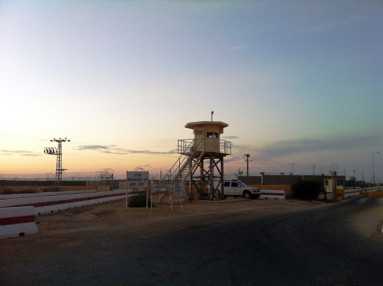
Watchtower on the outskirts of the camp. The demonstrating Bedouins invaded the camp through a similar construction in 2012
It is memorable, that the Bedouins, demonstrating in the surrounding area in September 2012 broke into the camp, in consequence of which the enhancement of security became justified. From the briefings it has come to light that the new watchtowers completed by early 2013 mean a vital element of the measures, by which – significantly increasing the efficiency of guarding – the number of such facilities was doubled.
State of emergency has been declared, curfew imposed owing to the insurgencies resuming in 2013 in the Northern part of the Peninsula, which should have ended on November 14 according to the prior announcement, but the MFO leadership has not yet been notified about the suspension of the sanctions by the authorities. The latter is in connection with the gradual deterioration of the security situation, the growth in the number of the IEDs, and other types of attacks and attempts. In Spring 2013, armed Bedouins kidnapped a Hungarian officer from a bus and held him briefly, which at the same time forced the MFO North Camp leadership for taking further security strengthening measures.
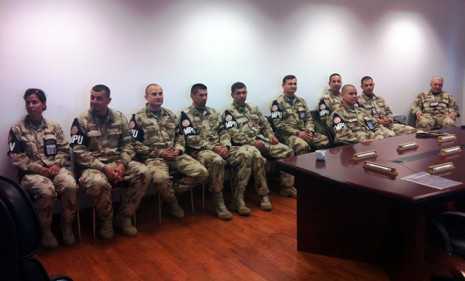
Staff Meeting in the MFO South Camp
The military and police personnel stationing in the camp – among them the Hungarians, too -, practiced the various CRC methods, the control of the stand-by situations besides their earlier skills. The severity of the rules concerning the camp leaving and the out-of-camp movement has been increased, so they have prepared by now for their task-execution and the management of the possible crises in spite of the bad security situation and the stalled infrastructure supplies. To demonstrate the truth of the previous statement the chief of staff finally cancelled the umpteenth practice of the night alarm considering the visit of the high-level Hungarian delegation.
The delegation will continue their tour on November 19 and 20, 2013 in Cyprus, visiting the 77 strong Hungarian Contingent serving in the UNFICYP (United Nations Peacekeeping Force in Cyprus) mission.
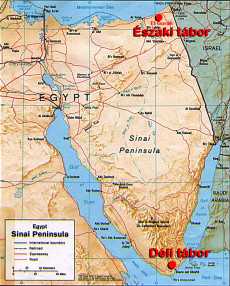
Hungarian camps in the Sinai Peninsula